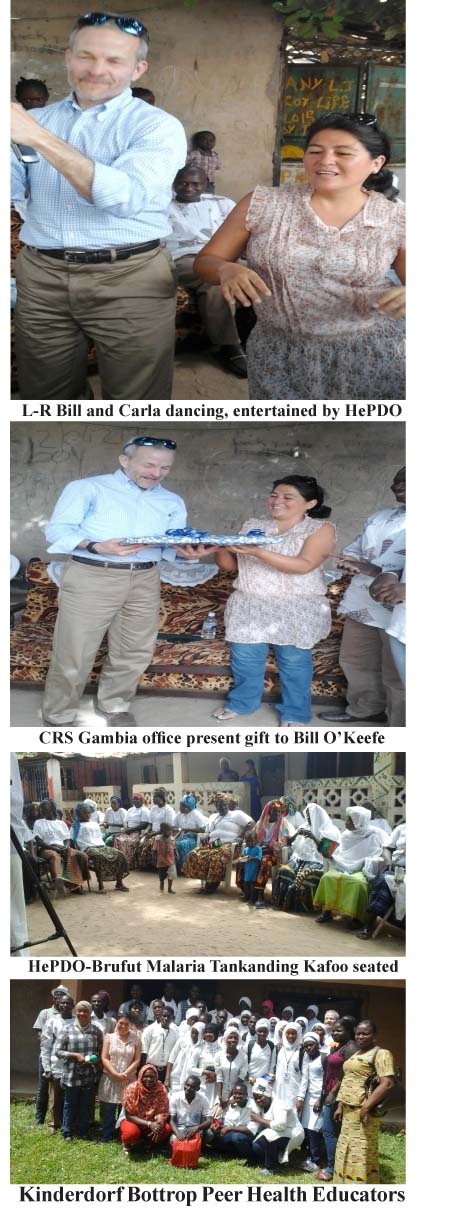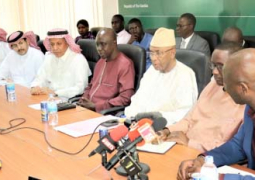
Bill O’Keefe was received at the Giboro border on Friday by the CRS officials from the Gambia office.
Bill O’Keefe and Madam Carla Fajardo, CRS country representaive for Senegal and The Gambia based in Dakar, visited Future in Our Hands, and a CRS HIV/AIDS project site where they held a meeting with the beneficiary community of Brikama Sanchaba.
They also held a meeting with the permanent secretary at the ministry of Health and other officials from the national malaria control programme.
The second day of the visit was to a CRS-Peer Health Educators training activity at Kinderdorf Bottrop Technical Senior Secondary School in Brikama in the West Coast Region.
The visit wrapped up at the Health Promotion Development Organization malaria project site in Brufut, followed by an exit debriefing meeting with CRS Gambia officials.
Ousman Njie, head of the CRS Gambia office, said Bill O’ Keefe is the Vice President of CRS responsible for government relations and advocacy, overseeing CRS’ efforts to change U.S. foreign policy in ways that promote justice and reduce poverty overseas.
Bill joined CRS in 1987, and had since held a variety of key positions focused on Africa, educating Americans about global poverty and injustice and changing public policy and he is also a board member of the U.S. Global Leadership Campaign.
In an interview with the press, Bill O’Keefe expressed his impressions about the projects and level of community participation in the projects implemented by CRS and its collaborating partners in the country.
“I am very impressed about the projects so far visited in the area of HIV/Aids and malaria,” said O’Keefe.
One thing he likes about the projects is that communities actively participate in the implementation of these projects, which had really impacted on the lives of the local people.
“We were very excited when President Obama mentioned malaria in Africa during his state of union address,” he said.
He added that fighting malaria and HIV/Aids in America is something that Republican and Democratic administrations are putting a lot of efforts into, to end the HIV/Aids and Malaria pandemic.
He noted that the American people and government are making very important contributions towards the eradication of malaria and HIV/Aids globally.
CRS as an agency in partnership with countries and local and international NGOs across the world, is doing its best to ensure healthy children and communities for effective participation in national development.
He thanked and commended the communities for the warm welcome accorded to him, adding that CRS would engaged its partners and collaborators to seek more funding to support the Gambian health sector, especially in the Malaria and HIV/Aids areas.
Ms Carla Fajardo, CRS country representative for Senegal and The Gambia based in Dakar, said she was impressed about the CRS and Gambia government relationship.
“I have been the CRS country rep for the past six months, and the relationship between the governments of The Gambia through the ministry of Health is impressive, and really Gambia is worthy of emulation.”
She added that CRS programmes and activities are in line with government policies and priority areas identified by the government of The Gambia.
Ms. Saffie Lowe Ceesay, permanent secretary at the Ministry of Health and Social Welfare expressed satisfaction for what she called as “an excellent partnership” between CRS and the ministry of Health.
The 15 years of collaboration between her ministry and CRS had yielded dividends, as a lot of significant progress has been achieved in the area of malaria across the country.
She assured CRS officials of her ministry’s continuous collaboration and commitment in the fight against malaria in the country, while appealing for support from CRS and its partners to fill in the funding gap.
Balla Kandeh, programme manager of National Malaria Control Programme gave a briefing on their interventions in the area of malaria prevention across the country.
He said the 2014 MIS results compared to the MIS 2010/11 showed significantly higher ITN usage among under-five children (24.2%), women aged 15-49 years (33.2%) and pregnant women aged 15-49 years (35.9%).
However, net usage in general population increased by only 3.6 per cent, whilst household possession of ITNs between MIS 2010/11 and MIS 2014 also increased by 6.2 per cent.
Pa Yusupha Sowe, programme manager Health Promotion Development Organization (HePDO), said his organisation is a locally registered non-governmental organization established on 14 June 1997.
The organization was formedto complement the efforts of the Gambia government and other development partners, taking into considerationthe alarming global malaria statistics coupled with increasing emergence of HIV/Aids, tuberculosis, poor environmental sanitation, increase occupational accidents/diseases, inadequate portable water supply, sanitation, rapid global warming and so on.
In Brufut HePDO,is implementing a malaria project through a local community called Brufut Malaria Tankanding Kafoo in collaboration with CRS, with the aimed of reducing the disease burden “which has severe economic implications that affect the productivity of our vital workforce, consequently weakening our country’s economy.
“We are focused on creating awareness, building the capacities of communities, health and human rights promotion and supporting socio economic development initiatives,” he added.



